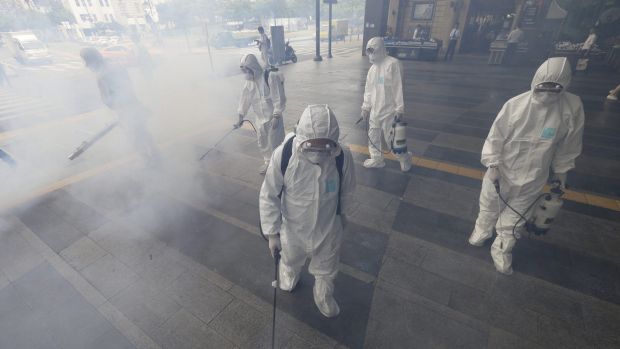An infectious diseases expert has warned Australia is at greater risk from the Middle East respiratory syndrome coronavirus than it was from Ebola, but Australian authorities insist the nation is prepared for any cases of the deadly disease.
The virus has killed 19 people in South Korea since last month in the largest known outbreak outside the Arabian Peninsula. To date, 161 cases have been confirmed in South Korea, and one case has been confirmed in China.

South Korean workers spay antiseptic solution outside a subway in an attempt to halt the spread of MERS in Seoul. Photo: AP
While no cases have been detected in Australia, Sanjaya Senanayake, an associate professor of medicine at the Australian National University, said it was likely Australia would get a case at some stage.
Professor Senanayake, an infectious disease specialist, said MERS-CoV posed a similar threat to Ebola.
“We went to a lot of trouble planning for Ebola, which was very sensible, but potentially the risk of getting MERS in Australia is even higher,” he said.
Michael Richards, the director of infectious diseases at the Royal Melbourne Hospital, said the hospital had discussed how a person presenting at its emergency department with a possible case of MERS-CoV could be treated in a manner which minimised the risk to staff and other patients.
Professor Richards, who also works at Epworth Hospital, said a person with the virus could spread it to others within four to six feet of them through coughing.
He said this meant procedures such as intubation of patients would have to be done in negative pressure areas to prevent the air being recirculated and infecting other people.
A spokeswoman for the federal Health Department said Australia was well prepared for any MERS-CoV case.
The spokeswoman said Australia’s Chief Medical Officer, Chris Baggoley, chaired the World Health Organisation emergency committee on MERS-CoV and remained in touch with senior public health officials around the globe on the issue.
Information about the virus was routinely shared by Professor Baggoley with state and territory chief health officers and a wide range of health and medical bodies including relevant medical colleges.
The spokeswoman said the Australian government had long-standing border surveillance measures in place, including a requirement for commanders of international flights to report any ill passengers on board prior to arrival and assessment of ill travellers at the border by agriculture department officers, with support from state and territory health systems where necessary.
The government had the ability to implement further, disease-specific measures such as mandatory travel history declarations and temperature monitoring, the spokeswoman said.
This week it put in place banners at international airports warning outgoing passengers about the disease.
It plans to provide further information to outgoing travellers through information cards and electronic signage next week.
Bram Alexander, a spokesman for Victoria’s Department of Health and Human Services, said an incident action plan had been developed with the state’s infectious diseases experts.
“Victorian hospitals and our medical staff are well equipped and well trained to deal with an infectious disease such as MERS should it be diagnosed in a returned traveller,” Mr Alexander said.
“Our major health services in Metropolitan Melbourne and our major regional centres have the ability to treat a patient in isolation should a case of MERS be diagnosed.”
Mr Alexander said Victoria had held discussions with the Commonwealth and other states and territories since the emergence of the outbreak in South Korea last month. These talks had included consideration of making MERS a notifiable condition, which would require laboratories and doctors to report any cases to the department.
Fairfax Media understands consideration is also being given to requiring people with the virus to be quarantined.
